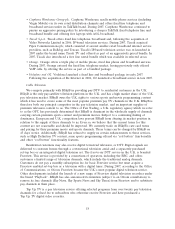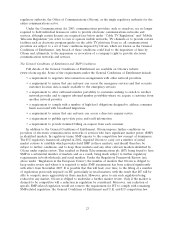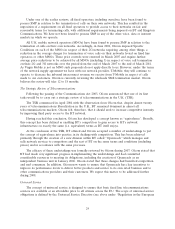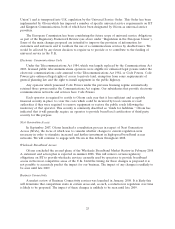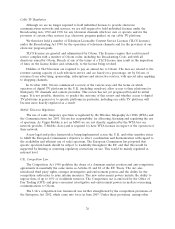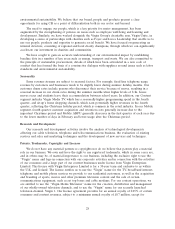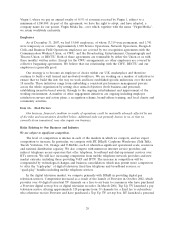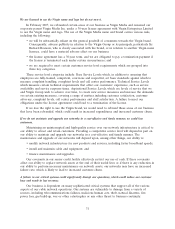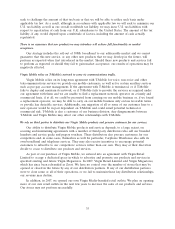Virgin Media 2007 Annual Report Download - page 28
Download and view the complete annual report
Please find page 28 of the 2007 Virgin Media annual report below. You can navigate through the pages in the report by either clicking on the pages listed below, or by using the keyword search tool below to find specific information within the annual report.Cable TV Regulation
Although we are no longer required to hold individual licenses to provide electronic
communications networks and services, we are still required to hold individual licenses under the
Broadcasting Acts 1990 and 1996 for any television channels which we own or operate and for the
provision of certain other services (e.g. electronic program guides) on our cable TV platform.
We therefore hold a number of Television Licensable Content Service Licenses (TLCS licenses)
under the Broadcasting Act 1990 for the operation of television channels and for the provision of our
electronic program guide.
TLCS licenses are granted and administered by Ofcom. The licenses require that each licensed
service complies with a number of Ofcom codes, including the Broadcasting Code, and with all
directions issued by Ofcom. Breach of any of the terms of a TLCS license may result in the imposition
of fines on the license holder and, ultimately, to the license being revoked.
Holders of TLCS licenses are required to pay an annual fee to Ofcom. The fees are related to the
revenue earning capacity of each television service and are based on a percentage, set by Ofcom, of
revenues from advertising, sponsorship, subscriptions and interactive services, with special rules applying
to shopping channels.
In October 2006, Ofcom commenced a review of the various ways and the terms on which
operators of digital TV platforms in the U.K. (including ourselves) allow access to their platforms for
third-party TV channels and content providers. This review has not yet progressed beyond its initial
stages. It is not possible, therefore, to predict the outcome of this review and whether access to digital
TV platforms in general or to specific platforms in particular, including our cable TV platform, will
become more heavily regulated as a result.
Mobile Telecoms Regulation
The use of radio frequency spectrum is regulated by the Wireless Telegraphy Act 2006 (WTA) and
the Communications Act 2003. Ofcom has responsibility for allocating, licensing and regulating the use
of spectrum. As Virgin Mobile is not an MNO we are not directly regulated by the WTA but our
network provider, T-Mobile, does (and is required to) have WTA licenses in respect of the operation of
their network.
A new legal and policy framework is being implemented across the U.K. and other member states
to fulfill the European Commission’s objective to effect coordination and harmonization with regard to
the availability and efficient use of radio spectrum. The European Commission has proposed that
specific spectrum bands should be subject to tradability throughout the EU and that this would be
supported by limiting or removing regulatory restrictions on use. This would be mainly regulated at
national level.
U.K. Competition Law
The Competition Act 1998 prohibits the abuse of a dominant market position and anti-competitive
agreements in essentially the same terms as Articles 81 and 82 of the EU Treaty. The Act also
introduced third party rights, stronger investigative and enforcement powers and the ability for the
competition authorities to issue interim measures. The new enforcement powers include the ability to
impose fines of up to 10% of worldwide turnover. The Competition Act is enforced by the Office of
Fair Trading (OFT) and gives concurrent investigative and enforcement powers in matters concerning
communications to Ofcom.
The U.K.’s competition law framework was further strengthened by the competition provisions of
the Enterprise Act 2002, which came into force in June 2003. Under these provisions, among other
26




